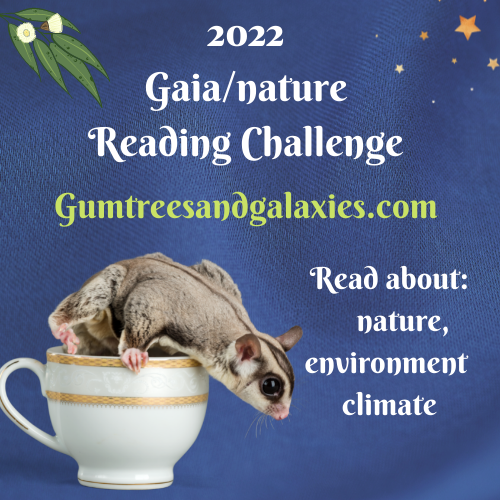Gaia/nature reading challenge update, with the end of the year rapidly approaching this will be one of the last 2022 updates, but will continue into 2023 with the new Gaia/nature challenge. I recently read a delightful account of Scottish wildlife in the remote Ardnamurchan region and an absolutely brilliant eco novel that I expect may be shortlisted for the next Miles Franklin, it certainly deserves to be.

I read a lovely account of Scottish wildlife in Polly Pullar’s A Richness of Martens. Pullar largely writes about the observations of Les and Chris Humphreys at their remote Scottish home at Ardnamurchan. The elderly couple found themselves hosting a community of martens amongst other wildlife and used it as an opportunity to observe and record behaviour, making several discoveries previously unobserved and demonstrating the value and reward of citizen science. They also overturned some misconceptions about the much-maligned pine marten. A highly entertaining little mammal the Humphreys found themselves in a very privileged position, with the martens feeling confident enough to even visit them in the house. Like all social mammals pine martens have fascinating and varied personalities and live in complex, multigenerational family groups.
Pullar also recounts some of her own wildlife experiences going back to her childhood and writes passionately about the wild beauty of Ardnamurchan. A landscape shaped by its location on the wild Atlantic, with storms beating and shaping the land and its inhabitants and yet still so fragile and vulnerable to human destruction.
Environment and wildlife dilemmas are never simple black and white stories but are often complex and challenging and but so often the source of the problem seems to be due to imbalances largely caused by human activity. Pullar captures the changing nature of the Scottish wilderness regions and the changing fortunes of several species but the prime focus is the pine marten, once persecuted almost to extinction due to its perceived threat to game birds. Birds of prey similarly suffered the same fate and numbers are only just recovering now. Still today the pine marten is the first to blame when looking at the decline of the capercaillie (wood grouse): There are other factors…loss and fragmentation of habitat, increased pressure on wild places from walkers, dogs and mountain bikers and the continual march of urbanisation. It is always easier to blame everything else other than ourselves, but the truth is that in most cases man is indeed the root of all evil and and is the reason for the declines in most, if not all, species.(p.117) Otters, seals, badgers, hedgehogs, amphibians and numerous bird species also feature in this delightful account of Scottish wilderness, knowledgeable, evocative and hopeful this is a delightful account.

I recently read Robbie Arnotts mythic new novel Limberlost. A compelling, evocative and magnificently crafted eco novel, I strongly suspect this beautiful novel will be the subject of much attention and a Miles Franklin contender in 2023. There is much packed into this short powerful novel, from the relationships of fathers and sons, growing up and our endlessly conflicted relationship with the natural world and our unresolved colonialist history. Arnott evokes the mythic from his opening line: “It was believed a whale had gone mad at the mouth of the river.” A novel of awe and wonder the story of the mad whale introduces the conflict and misunderstanding that seems to characterise white colonialist engagement with the world it has taken and seeks to turn to its own ends.
Largely set in the 1940s Tasmania, the novel is the story of Ned, mostly the summer of his fifteenth year when he hunted rabbits, dreamed of owning a boat and felt his way around his war haunted father, missing his two eldest sons, Ned’s brothers, now off to their own war. There are jumps in time and the story stretches into the future, but it is the idyllic summer that forms the core of the novel. Ned is of the world of Limberlost, his father’s orchard, a land already stolen and damaged but still able to anchor itself into the souls of its inhabitants. Ned is drawn to the awe and wonder of his world, it is that fascination that largely drives him to own a boat, in order to experience the wildness in its fullest. It is that same awe and wonder that leads him to save an accidently trapped quoll, despite the value of its pelt and its ferocious antagonism. The quoll and that seemingly casual decision to rehabilitate the creature, defines Ned, that beautiful feisty animal will haunt his thoughts, as mythic and as elusive as a unicorn, it defines the beauty of a natural world always under threat from exploitation. Arnott almost inconsequentially captures the soul and beauty of the bounty of the land in his evocative descriptions. Ned finally finds a broken wreck of a boat which he lovingly restores and the wonder of the land is embedded in its very timbers: “The odours of trees belonged to their leaves and flowers; he’d assumed timber would be mute. He wondered at his wrongness, as the wood spice filled his lungs, sank into his blood.”
I found a copy of Limberlost in the library after reading this article in The conversation, so rather than failing to do justice to this wonderful novel I will just share the above link, and this one to a story on the ABC I saw on the weekend about Robbie Arnott and his new novel. I will say I reveled in Arnott’s narrative, the beautiful description, the wonderfully realised characters, his perfect dialogue and magnificent tight, craftsmanship of his writing. I have had his previous novel, The rain heron on my TBR for some time, after reading Limberlost I am keen to read more by Robbie Arnott he is definitely an author worth reading.

“The spots on its pelt shone against the wood like a patterned moth, a living quilt” (p162).

